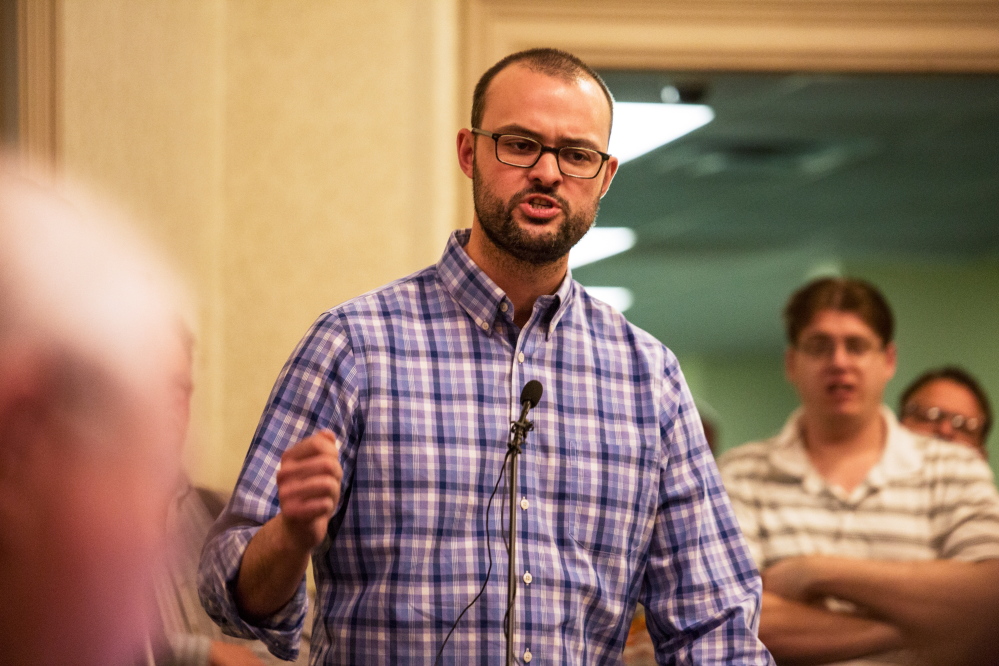Cumberland County District Attorney Stephanie Anderson says she will not prosecute allegations of sexual abuse by a former Biddeford police officer because the man who says he was abused did not agree to a list of conditions, including that he turn over additional information and provide his medical records.
An investigator with the Maine Attorney General’s Office has been investigating recent claims by Boston businessman and former Biddeford resident Matt Lauzon that he was molested when he was a teenager by Stephen Dodd, a former Biddeford officer, and also by Michael McKeown, a registered sex offender in Biddeford. Lauzon has gone public with the allegations of abuse, and has said that Biddeford police were aware of Dodd’s conduct and did nothing to stop it.
Attempts to reach Dodd for comment have been unsuccessful, and McKeown has denied that he molested Lauzon, saying they had a consensual encounter when Lauzon was 18 or 19.
The Attorney General’s Office was called in to investigate the case because the Biddeford Police Department might have a conflict investigating one of its former officers and because of the allegations against the department command staff. Similarly, the York County District Attorney’s Office – which would normally prosecute a case of sexual molestation in that county – opted out of the case to avoid the appearance of a conflict because of its working relationship with Biddeford police.
Brian MacMaster, head of investigations for the Attorney General’s Office, asked Anderson to consider taking the case as the prosecutor who would review the evidence and, if warranted, pursue a criminal case.
Anderson said before she embarked on a time-consuming review of the investigation so far, and because of the complexities of trying to build a case with 17-year-old allegations, she wanted Lauzon to agree to a set of conditions.
Walter McKee, a criminal defense lawyer who represents Lauzon, said the conditions were unprecedented and he and his client rejected them.
“I’ve never seen a case in my career where conditions were placed on a victim for even a review for criminal prosecution,” McKee said Friday. He said the case is not unlike hundreds of others Anderson’s office has prosecuted.
“When somebody reports they have been a victim of a crime, the ordinary course that happens in every single case in Maine, the prosecutor reviews the case and makes a decision. Here we can’t even get them to make the first step,” McKee said.
Anderson wanted Lauzon to turn over information he has that may bear on the case, which he described to the attorney general’s investigator, Michael Pulire, but which Pulire has been unable to acquire. Anderson said she does not believe the case would lead to a conviction with the information she has now.
She also wanted assurances that Lauzon trusted her to investigate the case fairly.
“I do not want to be tarred with the brush of bad faith and incompetence following a diligent and time-intensive and good faith effort to get to the bottom of this if the outcome differs from your client’s wishes,” she said in an email to McKee.
Anderson also said she planned to issue a report at the conclusion of her review if it did not lead to charges so the public would know why.
But the main sticking point was a demand by Anderson that Lauzon release his medical records.
Anderson said during an interview that she believed there was information in them that was relevant to the case, and that a defense attorney would likely subpoena that information in an effort to challenge Lauzon’s credibility. In her email to McKee, she was more specific.
“We have information that your client’s ability to recover memories of at least some of the details and events 17 years ago were assisted by ‘unconventional’ or ‘unorthodox’ treatment or counseling,” Anderson wrote. “Of course I would have to know about this. And this would be asked of any victim.”
McKee said there is no reason Lauzon should waive the confidentiality between doctor and patient.
“Victims aren’t required to give up important privileges to highly sensitive information so that a prosecution can go forward,” he said in an email to Anderson. “This information would not address any element of the offense.”
“Knowing the extensive counseling Matt has received because of what was done to him, there’s no question he talked about what happened,” McKee said Friday. “The disclosure of those records would have no impact on his credibility. Arguably it would enhance his credibility.”
Anderson said her decision not to agree to take the case should not be construed as exonerating Dodd, though she would not elaborate.
She said some other district attorney or prosecutors in the Attorney General’s Office could take on the case.
Even if criminal charges are not pursued, an anticipated civil case involving the city of Biddeford will likely move forward, McKee said.
Send questions/comments to the editors.




Success. Please wait for the page to reload. If the page does not reload within 5 seconds, please refresh the page.
Enter your email and password to access comments.
Hi, to comment on stories you must . This profile is in addition to your subscription and website login.
Already have a commenting profile? .
Invalid username/password.
Please check your email to confirm and complete your registration.
Only subscribers are eligible to post comments. Please subscribe or login first for digital access. Here’s why.
Use the form below to reset your password. When you've submitted your account email, we will send an email with a reset code.